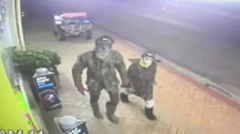The search near Kenya's Shakahola Forest has revealed nine additional bodies, raising fears about a cult led by Paul Mackenzie, who allegedly urged followers to die by starvation. Recent findings suggest that the cult’s activities may still continue despite previous investigations.
New Discoveries Linked to Kenya's Starvation Cult Raise Alarm

New Discoveries Linked to Kenya's Starvation Cult Raise Alarm
Nine bodies unearthed from graves near Shakahola Forest revives concern about the ongoing activities of a notorious starvation cult.
Detectives in Kenya have unearthed nine bodies from freshly uncovered graves in a troubling development linked to the infamous starvation cult that gained notoriety earlier this year. This shocking discovery is part of an ongoing investigation into a mass death case that has so far revealed over 400 bodies buried in the Shakahola Forest, located near the coastal town of Malindi.
It is believed that these individuals were followers of Paul Mackenzie, a self-proclaimed pastor accused of encouraging his followers to starve themselves under the belief that doing so would expedite their passage to heaven. As part of the efforts to uncover the truth, prosecutors announced in July the arrest of 11 individuals, including three who were previously followers of Mackenzie during the so-called "Shakahola Forest Massacre."
Recent exhumations were prompted by the disappearance of several children from the area, heightening concerns that the cult might still be operational. In April, Interior Minister Kipchumba Murkomen voiced fears regarding Mackenzie’s continued communication with followers while incarcerated, reportedly using a mobile device.
Mackenzie has entered a not-guilty plea to manslaughter charges and his case has seen delays due to the emergence of new evidence. Recent exhumation efforts revealed five bodies on Thursday and a further four on Friday at a site in Kwa Binzaro village, not far from Shakahola Forest. Government pathologist Richard Njoroge indicated that the extensive search area could yield more remains as efforts continue.
Authorities are soliciting information from the public regarding any missing persons, inviting families to Malindi District Hospital for DNA sampling in hopes of identifying the deceased. The alarming context surrounding these findings suggests a grim reality; according to Kenya's Office of the Director of Public Prosecutions, those interred may have suffered starvation or suffocation resulting from extreme religious beliefs.
Hussein Khalid, a human rights activist present during the exhumations, shared disturbing observations—one corpse appeared to have been buried only weeks prior, while others showed signs of having been there for a longer duration. The condition of one grave suggested that a body might have been removed recently, with only remnants of children's and women's clothing left behind, hinting at a possible targeting of vulnerable populations within the cult’s ranks.
As the investigation unfolds, the public remains alert to the possibility that the influence of the starvation cult persists, necessitating vigilant community involvement to ensure safety from such extremist ideologies.
















